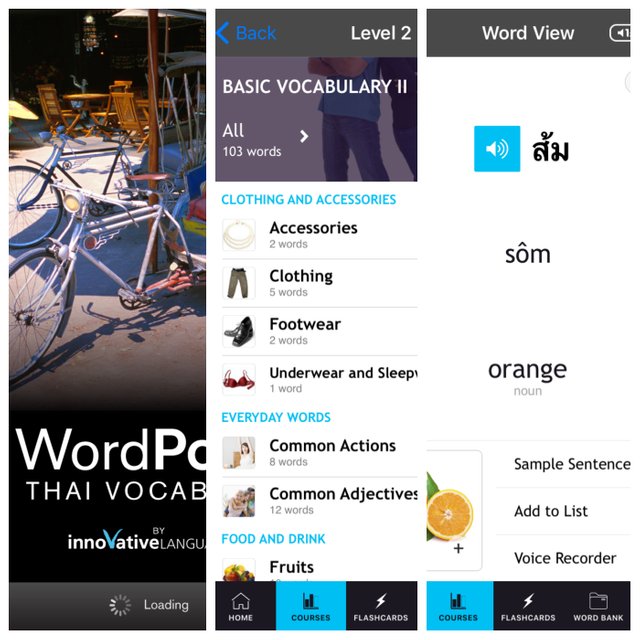Hello, Steemians! In my last posts I talked about the reasons why you can learn Thai without ever going to Thailand and resources you can use when you start learning Thai not being in Thailand. Today I would like to talk about how to do it and what to pay attention to during your first weeks and months of learning Thai language.

Tones
Thai, unlike English or German, is a tonal language, meaning pronouncing a syllable with a particular tone will change its meaning. Now, this sounds very abstract and foreign for most of us, Westerners, however it is not as scary it seems. Firstly, there are 5 tones in Thai language and you will have to remember their notation over romanized Thai transciption:
- middle tone - ปา - bpaa
- low tone - ป่า - bpàa
- falling tone - ป้า - bpâa
- high tone - ป๊า - bpáa
- rising tone - ป๋า - bpǎa
It's important to remember the romanized notation first, you will operate it before you learn to read Thai. You can see as an accent symbol above "a", the middle tone doesn't have any accent symbol, which means you should pronounce is as the middle tone.
Practising tones will take you a while, I would say anywhere between a few days to a few weeks. I recommend practising tones with some youtube Thai teachers, here's an example of a good practice video by the master himself, Stuart Jay Raj:
Perhaps the video above would be a good introduction and explanation, but for everyday practice you might find this one more helpful:
As I mentioned before, I suggest practising tones for at least a few days, an hour or so a day. It is essential to have at least some basic skill of hearing and pronouncing the tones; it will be hard to make another step without it.
Vocabulary
Once you are familiar with the tones it is time to build your mental dictionary. I think you should aim at learning at least 500 words in your first weeks of learning Thai, say 10 words a day for your first 50 days or studying Thai language. It sounds very realistic, to my mind, and will simply speed many things up if you can operate at least 500 basic words. I would use for this purpose mainly WordPower app, which I mentioned in my previous post. The app is quite professional and clean, I'm sure you'll enjoy using it. It's got recorded pronunciation, which you can play slow and fast, and example sentences for each vocabulary item. A very useful tool, in my opinion, that will make your Thai vocabulary practise enjoyable and effective.

Reading Thai
Before you start working on your vocabulary, it would be wise to learn to read at least a few consonants and vowels, so that Thai script would look less like magical runes haha. I recommend the book which I mentioned in my previous post, "Cracking Thai Fundamentals" by the polyglot, Suart Jay Raj. Chapters: "Cracking the Thai Vowels" and "Cracking the Thai Consonants" in this book will be a good starting point for you.
Pronunciation
You will, obviously, find vowels and consonants in Thai that are pronounced in a different way than any language you probably now. Thus, it is important to start practising the pronunciation the right way, in order to get your muscles acquainted with new sounds and not to develop any bad habits. Again, the Thai language guru, Stuart Jay Raj, has got many videos on Thai pronunciation on youtube :
Phrases and Basic Conversational Skills
You will definitely want to learn at least a few dozen useful phrases in Thai before you set your foot in the Land of Smiles. Dealing with taxi drivers, waiters and shop assistants will be way more pleasurable then! Thai people will be even friendlier you if you make effort to order your food in Thai or tell the taxi driver your destination in Thai. I would recommend Mod's youtube channel, lots of useful and entertaining videos there!
I've had lots of fun writing my little Thai language post series, I hope you've enjoyed reading them! Come back for more language and guitar content! Full Steem On!
Earworm
Hi Earworm. Thanks for a very interesting series of posts. I'm in the same situation as you - a European attempting to learn Thai after some experience of European languages ( though I have to confess I haven't attempted to learn as many as you have!)
I've come across a good proportion of the resources you've mentioned, but some of them are new to me. I'm definitely going to check them out.
I really should get around to actually posting something on Steemit soon, so maybe I'll make a post about my own experience of learning Thai. Unlike, say, French or Spanish, there is no huge well of resources for learning Thai, so the more we share the better.
โชคดีครับ :)
Downvoting a post can decrease pending rewards and make it less visible. Common reasons:
Submit
Hi, @explore-thailand. I agree with you, the resources are limited, however if you dig deep you will find the minimum bare to learn and master the language. I think Stuart Jay Raj's book, "Cracking Thai Fundamentals", and in general his contribution to the field made a big difference in recent years.
ขอบคุณครับผม ;)
Downvoting a post can decrease pending rewards and make it less visible. Common reasons:
Submit
Hi @earworm. I took my Nursing master degree in Thailand taught in english. However... for daily activities I learned thai from classmates. I found that its not so difficult learning spoken thai but so difficult to read the written. Perhaps you will post another content about how to read Thai. Thanks.
Downvoting a post can decrease pending rewards and make it less visible. Common reasons:
Submit